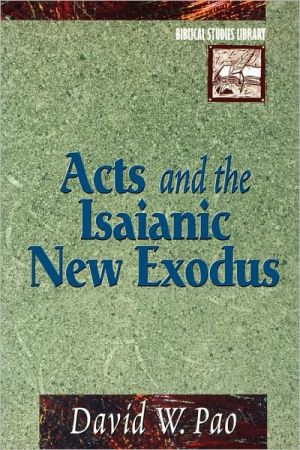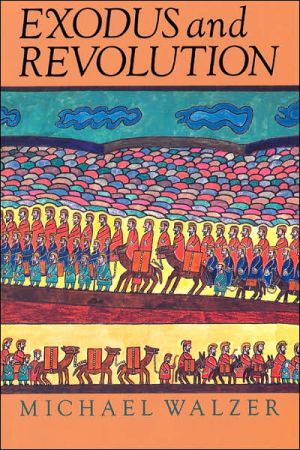Acts And The Isaianic New Exodus
For an eye-opening understanding of Acts, readers discover clues to its structure and meaning hidden in Isaiah and the "new Exodus" message.
Search in google:
For an eye-opening understanding of Acts, readers discover clues to its structure and meaning hidden in Isaiah and the "new Exodus" message.
PrefacevChapter 1Introduction11.1Approaches to the Study of the Acts of the Apostles11.2The Scriptural Story and the Narrative of Acts within the Context of Lukan Scholarship5A.The "Use" of Scripture in the Lukan Writings5B.Isaianic New Exodus and the Narrative of Acts101.3The Plan of the Present Study171.4Historical Plausibility20A.Authorial Context20B.Temporal Context26C.Literary Context29Chapter 2Continuity and Discontinuity: The Significance of Isa 40:1-11 in the Lukan Writings372.1Introduction372.2The Presentation of the Isaianic Program in Luke-Acts382.3The Evocative Power of Isa 40:3-5: The New Act of God412.4Isaianic Themes in the Lukan Construction of an Identity Claim45A.Isa 40:1-2: The Restoration of the People of God46B.Isa 40:3-5: Universal Revelation of the Glory/Salvation of God47C.Isa 40:6-8: The Power of the Word of God and the Fragility of the People48D.Isa 40:9-11: The Restoration of the People of God502.5Isaiah 40-55: The Redefinition of the People of God and the Evocation of the Foundation Story of Ancient Israel51A.Isa 40:1-11 and the Introduction of the Exodus Paradigm52B.The Transformation of the Exodus Paradigm in Isaiah 40-55552.6Who is the "True Israel"? [characters not reproducible]-Terminology as an Identity Claim in Acts592.7Conclusion69Chapter 3Isaiah and the Hermeneutical Framework of Acts: Statements that Frame the Narrative703.1Introduction703.2Luke 4:16-3070A.The Text of the Isaianic Quotation in Luke 4:18-1971B.The Evocation of Isa 61:1-2: The New Age for the People of God74C.The Reinterpretation of Isa 61:1-2: The Lukan Redefinition of the People of God783.3Luke 24:44-4984A.The Allusion to Isa 49:6 in Luke 24:46-4784B.Isaiah and the Extension of the Markan Story of Jesus86C.Isaiah and the Justification of the Gentile Community: The Lukan Characterization of the Early Christian Movement893.4Acts 1:891A.Allusions to Isaiah in Acts 1:891B.Isaiah and the Groundplan of Acts: Isaianic New Exodus as the Hermeneutical Grid for the Story of Acts93C.The Use of the National Story of Israel: The Establishment of the Kingdom of the People of God953.5Acts 13:46-4796A.The Text of the Isaianic Quotation in Acts 13:4796B.The Transformation of the Isaianic New Exodus: The Accomplishment of the Lukan Redefinition of the People of God98C.The Ecclesiological Focus of the Isaianic Program: From the Stories of Jesus and the Apostles to the Story of the Community1003.6Acts 28:25-28101A.The Text of the Isaianic Quotation in Acts 28:25-28102B.Isaiah and the Lukan Justification of the Rejection of the Prophetic Movement: The Development of the Competitive Claim concerning the People of God104C.From Luke 3 (Isaiah 40) to Acts 28 (Isaiah 6): The Dramatic Reversal of the Isaianic Program1053.7Conclusion109Chapter 4The True People of God: The Restoration of Israel1114.1Introduction1114.2Isaiah and the Restoration of Israel112A.The Reconstitution of Israel112B.The Ingathering of the Exiles113C.The Community to the Spirit115D.The Rebuilding of the Davidic Kingdom117E.Repentance and the Turn to the Lord118F.The Inclusion of the Outcasts1204.3Acts and the Restoration of Israel122A.The Reconstitution of Israel123B.The Ingathering of the Exiles129C.The Community of the Spirit131D.The Rebuilding of the Davidic Kingdom135E.Repentance and the Turn to the Lord138F.The Inclusion of the Outcasts1404.4Conclusion143Excursus: The Continuing State of Exile143Chapter 5The Agent of the New Exodus: The Word of God1475.1Introduction1475.2The Process of the New Exodus: The Conquest of the Word150A.The Itinerary of the Word of God150B.The Hypostatization and the Power of the Word1605.3The Goal of the New Exodus: The Creation of the Community of the People of God167A.The Growth of the Word and the New Community of the Exodus Traditions167B.The Early Christian Community as the Sole Possessor of the Word1715.4Conclusion176Excursus: The Word of God in Context177Chapter 6The Lord of the Nations: The Anti-Idol Polemic1816.1Introduction1816.2Anti-Idol Polemic and the Isaianic New Exodus182A.The Powerlessness of the Idols and the Nations in Isaiah 40-55183B.The Sovereignty of Yahweh in Isaiah 40-551896.3Anti-Idol Polemic and the New Exodus in Acts193A.The Powerlessness of the Idols and the Nations in Acts193B.The Sovereignty of the Risen Jesus in Acts2096.4Conclusion212Excursus: Isaianic Influence on Second Temple Jewish Idol Parodies213Chapter 7The Transformation of the Isaianic Vision: The Status of the Nations/Gentiles2177.1Introduction2177.2The Nations/Gentiles in the Isaianic New Exodus218A.The Universalistic Concern for the Nations in Isaiah218B.The Particularistic Emphasis on Israel in Isaiah220C.Universalism and Nationalism in Isaiah2217.3The Gentiles in the New Exodus in Acts227A.The Focus on the Mission to the Gentiles in Acts227B.The Impartiality of God and the Soteriological Equality of Jews and Gentiles236C.The Response of the Jews and the Mission to the Gentiles2437.4Conclusion245Excursus: Jews and Gentiles in the Final Age245Chapter 8Conclusion2498.1Summary2498.2Implications for the Study of the Lukan Use of Scripture2518.3Implications for the Study of the Theology and Narrative of Acts252Bibliography255Index of Ancient Sources285Index of Authors302Subject Index308


